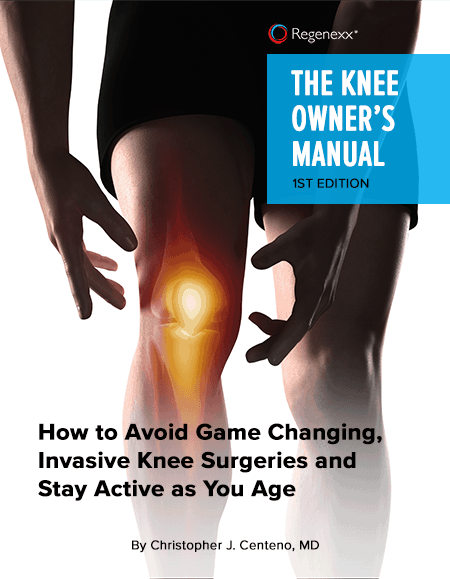CONTACT US. 530-444-4767
We understand how it feels to be frustrated by knee pain.
You may feel frustrated, anxious, and afraid. Feeling like you might not get to participate in activities you’ve always enjoyed, fearful that you might need surgery that could affect you for the rest of your life.

Are you frustrated by pain? Afraid you might need life-altering surgery?
You’re not alone. We can help.
Complete this short form and get your FREE copy of The Knee Owner’s Manual, plus receive valuable information that can help you avoid invasive surgery.
Partial knee menisectomy is a very common surgery that involves removing the torn part of the meniscus. The meniscus is a natural shock absorber for the knee. In fact, in America alone, we perform about 700,000 of these surgeries per year, making it one of the most common orthopedic surgeries. While most patients think they’re getting a meniscus repair procedure, the truth is, 96% of these surgeries just remove a piece of the shock absorber, leaving your knee less protected.
There have been many high-quality research studies over the past decade or more that were designed to answer the specific question, “Is surgery necessary for a torn meniscus?” What did they show? All three large studies showed that meniscus surgery was not effective or no better than just physical therapy.
We offer innovative non-surgical procedures that may help decrease pain and improve knee function and mobility without the need for surgery.
Meniscus surgery is traumatic and carries associated risks. Even successful surgeries require months of painful rehab to regain strength and mobility. After surgery, most patients will be on crutches, wear a brace, or some combination of both for several weeks before returning back to normal activity. The recovery time and rehabilitation period may be extended up to six weeks with a knee brace or crutches.
Keep in mind that there may even be some complications associated with meniscus surgery, prolonging the recovery period even more. This includes complications with anesthesia, such as respiratory or cardiac malfunction, infections, and injury to nerves and blood vessels, fracture, weakness, stiffness or instability of the joint, inability to repair the meniscus, repeated rupture of the meniscus, or the need for additional surgeries.
Can you ever truly recover from parts of your knee meniscus being removed surgically? In the long run, almost all meniscus surgeries accelerate degeneration that leads to osteoarthritis and exacerbate the biomechanical problems that initially led to the need for the surgery.
Meniscus tears are like wrinkles; they are unavoidable. Some of us get more of them at a young age and some of us don’t get a lot of them until we’re older. The meniscus gets small tears as we age and as the knee joint begins to wear out. For example, in middle-aged and elderly patients, taking an MRI of patients with no knee pain and those with ongoing knee pain will reveal that both groups have about the same amount of meniscus tears. If these things usually don’t cause pain, why are we operating on them? If our surgeries are no better than fake surgeries, why are we placing all of these patients at the risk of surgical complications?
Recent research shows that some of the most popular orthopedic knee surgeries, including meniscectomies, have no benefit and are not more effective than placebo or sham surgery. But can a meniscus tear heal on its own when left untreated? Non-surgical treatments for meniscus tears for healing on their own include physical therapy, rest, ice, compression and elevation. Interventional orthopedics also provides a non-surgical injection alternative that may prove beneficial in reducing pain and improving function.
Have you been told that invasive surgery is your only option to fix your torn ACL? Getting your ACL replaced permanently alters the mechanics of the knee joint. You have other options when it comes to treating your ACL injury. In fact, about 70% of all ACL tears that currently get surgery could have been treated with a precise injection.
Your body is built to repair itself and our goal is to save your ACL, not replace it. We offer a non-surgical alternative for ACL tears that requires advanced injection skills using X-ray guidance, which may aide the healing of your ACL tear, while reducing pain and increasing function.
Multiple studies show that meniscus surgery doesn’t work.
If your MRI shows a meniscus tear, you might be asking: Do I need surgery?
But here’s the more important question: Is the torn meniscus causing my knee pain?

Mountain View Rehabilitation Medical Associates Doctors
Dr. Joel Richnak is Managing Partner at Mountain View Rehabilitation Medical Associates where he is Co-Chairman of their sports and spine specialty clinic. He is also a Consulting Physiatrist for Sierra Nevada Memorial Hospital in Grass Valley, CA. Dr. Richnak received his medical degree from St. George’s University School of Medicine in 1999 and went on to complete his residency in Physiatry at the Mt. Sinai School of Medicine in New York, NY in 2003. He has been board certified in Physical Medicine and Rehabilitation since 2004 and earned his Sports Medicine sub-specialty board certification in 2013. Since completing his residency, Dr. Richnak has consistently pursued additional professional training, driven by his strong interest in regenerative medicine and its ability to help the human body heal itself. This led to training in prolotherapy in 2007, followed by training in regenerative medicine concepts and treatments in 2014. In 2015, he was brought on as a Regenexx affiliate – the foremost regenerative medical company, offering the most advanced stem cell and platelet procedures. Since 2003, Dr. Richnak and his family have lived in the Sierra Foothills of Northern California. He is an avid outdoor sports enthusiast, with experience as a climbing and back-country ski guide. He and his family spend much of their leisure time cycling, running, backpacking, and skiing the mountains of the Sierra Nevada.
Areas treated: Cervical Spine (Not Upper Cervical or CCI)*, Elbow, Foot & Ankle, Hand & Wrist, Hip, Knee, Lumbar Spine, Shoulder, Thoracic Spine
Dr. Gary Glaze was born in Tempe, Arizona and graduated from Arizona State University with a Bachelors in Science degree in Biology. He went on to Des Moines, Iowa and attended the College of Osteopathic Medicine and Surgery (Des Moines University) where he graduated with honors. After an internship in Cleveland at Richmond Heights general Hospital, he practiced medicine in the United States Navy. By 1988, he had completed both a Residency in Anesthesiology and Fellowship in Pain management at National Naval Medical Center Bethesda, Maryland. From here he went to Balboa Naval Hospital in San Diego, California to become the Director of the Pain Management fellowship program. He moved to Sacramento, California in 1990 and practiced Anesthesia and Pain Management at Mercy General Hospital. While still in the US Navy Reserves, he went to Saudi Arabia for Operation Desert Shield/Storm in 1991. He moved to Nevada City, California in 2001 and began a solo practice in Interventional Pain Management and Anesthesia in 2005. He continues to practice Sacramento, Roseville and Grass Valley, California. He consults and treats patients at the Regenexx Clinic in Grass Valley, California. Dr. Glaze is Board Certified in Anesthesia and also in Pain Management.
Areas treated: Cervical Spine (Not Upper Cervical or CCI)*, Lumbar Spine, Thoracic Spine
*DISCLAIMER: Like all medical procedures, Regenexx® Procedures have a success and failure rate. Patient reviews and testimonials on this site should not be interpreted as a statement on the effectiveness of our treatments for anyone else.
Providers listed on the Regenexx website are for informational purposes only and are not a recommendation from Regenexx for a specific provider or a guarantee of the outcome of any treatment you receive.




